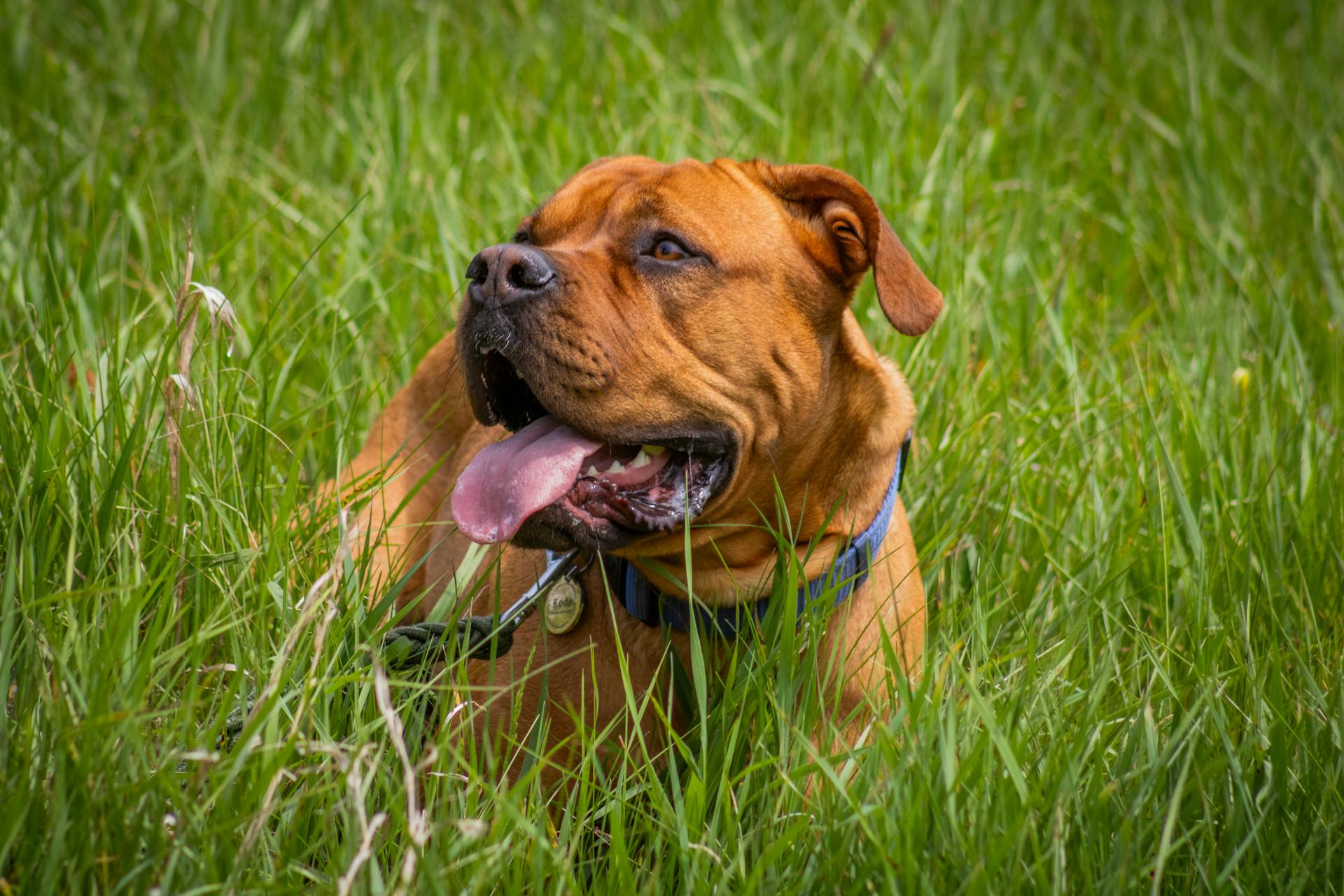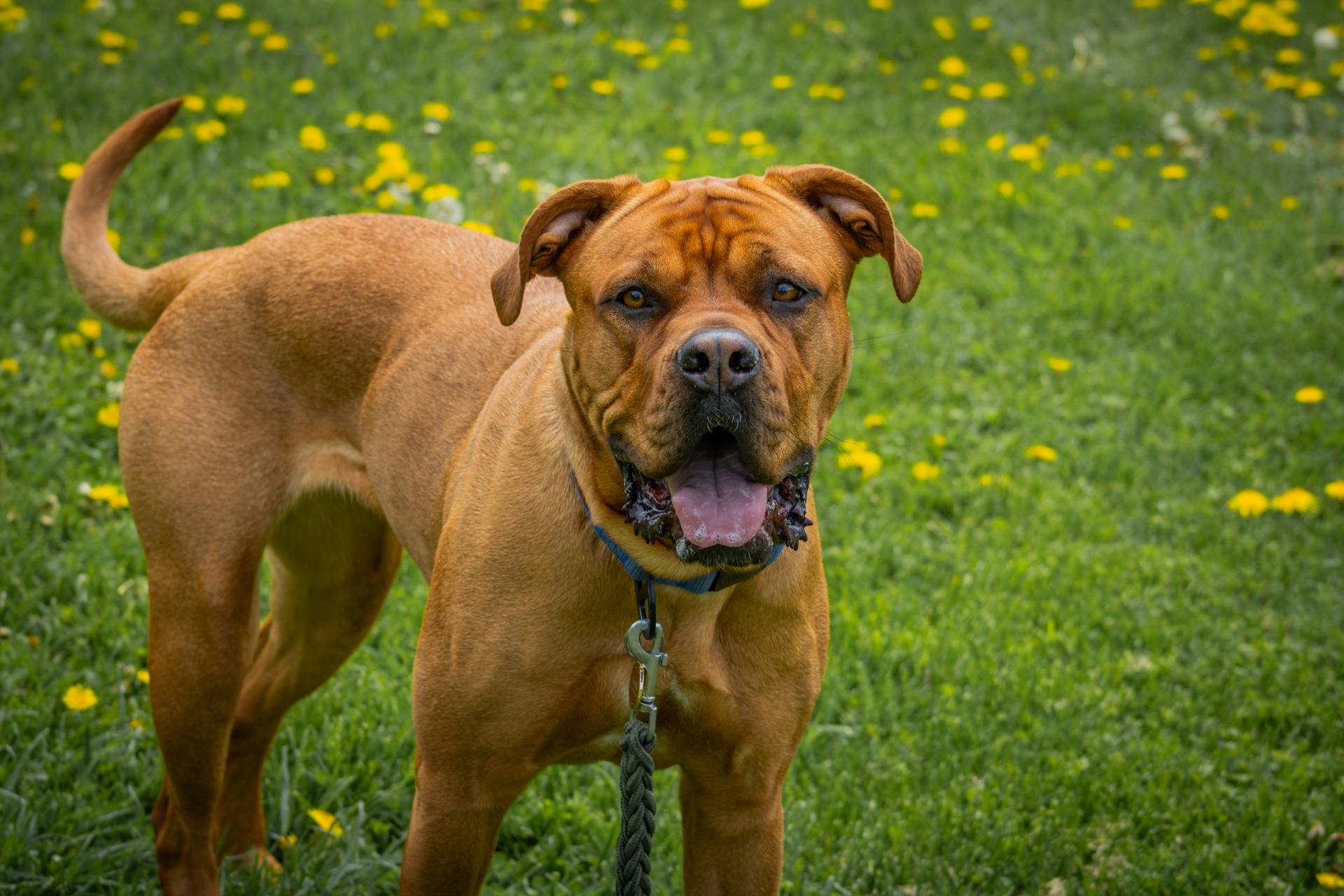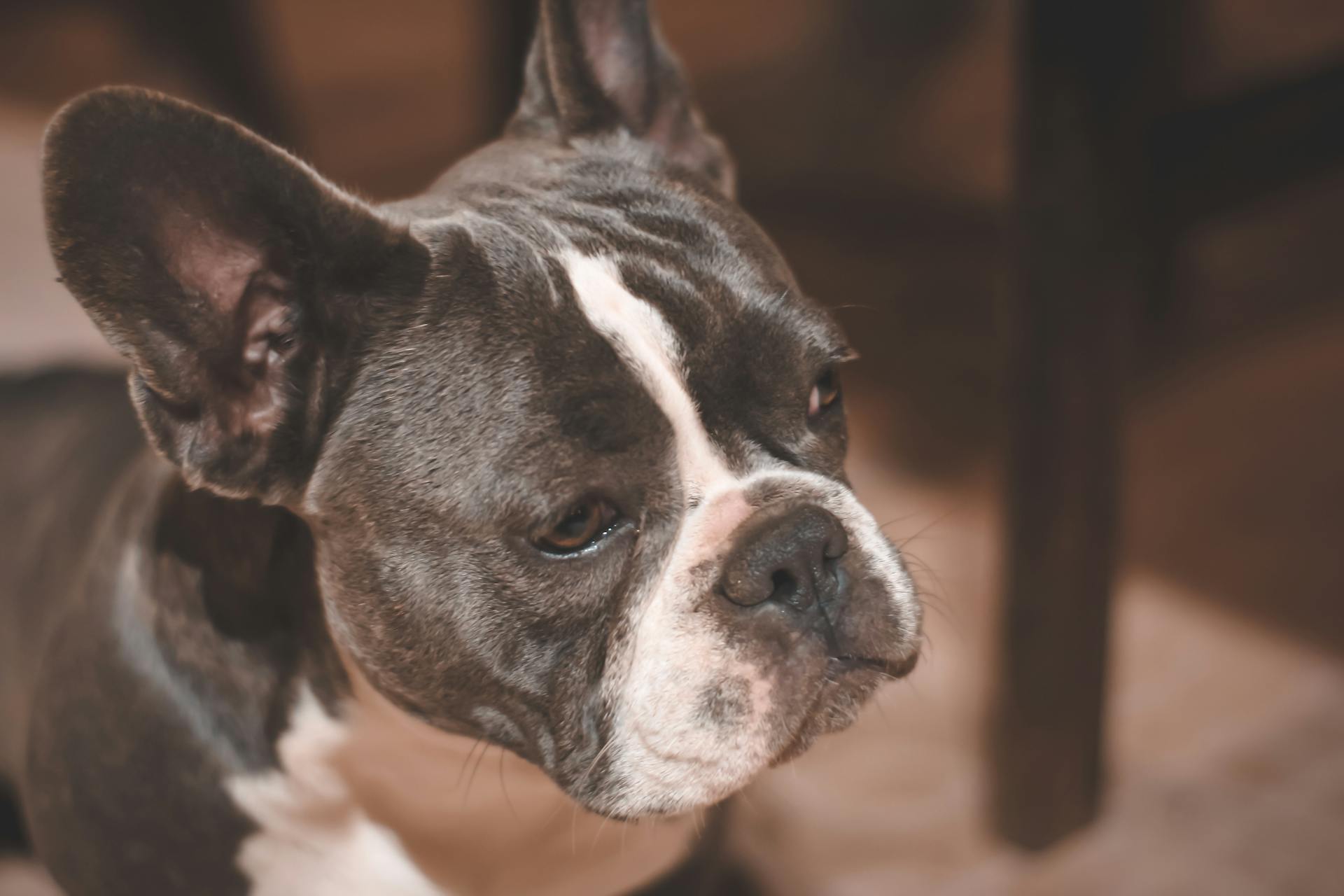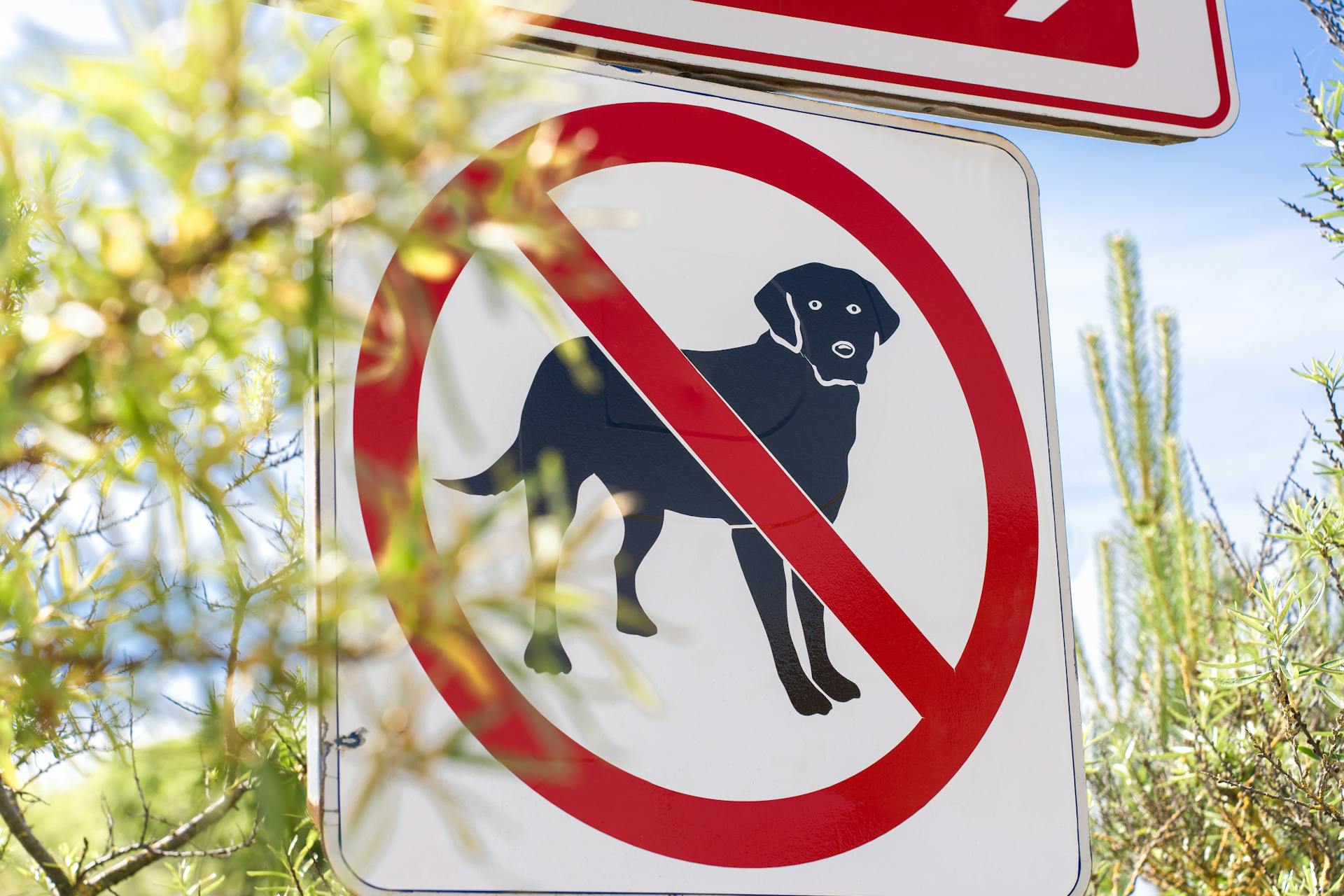
The Dogue de Bordeaux is a breed that requires a significant investment, both financially and in terms of time and care. They can be quite expensive to purchase, with prices ranging from $8,000 to $10,000.
Their large size means they need plenty of space to move around and exercise regularly, which can be a challenge for city dwellers. A large backyard or regular trips to the park are essential for keeping them happy and healthy.
Their short coats are relatively low maintenance, but they do shed heavily, so regular brushing is a must. They also need regular nail trimming, ear cleaning, and dental care to prevent health issues.
Dogue de Bordeaux owners should be prepared to spend around $1,000 to $1,500 per year on veterinary care, including vaccinations, check-ups, and potential health issues.
Related reading: Pronounce Dogue De Bordeaux
Quick Facts
The Dogue de Bordeaux is a magnificent breed with a rich history. Originating from France's Bordeaux region, this gentle giant has stolen hearts worldwide.
Here are some quick facts about the Dogue de Bordeaux:
- Their average weight ranges from 99-110 pounds (45-50 kg) for females and 110-145 pounds (50-66 kg) for males.
- They typically live for about 6-10 years.
- Their short, dense coat comes in various shades of fawn, ranging from light to dark.
- Regular walks, playtime, and mental stimulation are essential to keep them content.
- Early socialization and consistent, positive reinforcement training are crucial due to their protective nature.
- Their short coat is relatively low-maintenance, but regular brushing keeps their coat healthy, and skin folds should be cleaned to prevent infections.
- Unfortunately, they can be prone to certain health issues, including hip and elbow dysplasia, heart problems, and joint-related concerns.
Their calm and gentle nature makes them a wonderful companion for families, but they do have some specific needs to ensure they thrive.
Size and Health
The Dogue de Bordeaux is a large breed with a sturdy build, but its size comes with some health concerns. Males stand 23.5 to 27 inches at the shoulder and weigh a minimum of 110 pounds, while females stand 23 to 26 inches at the shoulder and weigh a minimum of 99 pounds.
This breed's size can put strain on its bones, joints, and ligaments, resulting in dysplasia in the hips, elbows, and shoulders.
Here are some common health issues seen in the Dogue de Bordeaux:
- Bloat: A life-threatening condition where the stomach twists and obstructs blood supply to major organs.
- Orthopedic Issues: Dysplasia in the hips, elbows, and shoulders, which can be painful and require surgery or medication.
- Heart Disease: Dilated cardiomyopathy (DCM), a condition where the heart becomes enlarged and weak, and aortic stenosis, a narrowing of one of the valves of the heart.
- Lymphoma: A type of cancer that can be found through a blood test, typically treated with chemotherapy.
- Epilepsy: Seizure disorders that can be managed with medication.
- Hereditary Footpad Hyperkeratosis: A condition where the skin on the footpads develops abnormally, resulting in hardening that leads to splits and cracks.
Size
When considering the size of a Dogue de Bordeaux, it's essential to know that males stand 23.5 to 27 inches at the shoulder.
Males can weigh a significant amount, with a minimum of 110 pounds.
Females are slightly smaller, standing 23 to 26 inches at the shoulder.
Their weight is also lower, with a minimum of 99 pounds.
Health

The Dogue de Bordeaux is a large and powerful breed, but with its size comes some health concerns that owners should be aware of. Hip dysplasia is a common issue, where the hip joint doesn't develop properly, leading to pain and arthritis.
Regular exercise and proper breeding practices can help reduce the risk of hip dysplasia. Elbow dysplasia is another condition that affects the elbow joint, causing lameness and pain.
Heart problems are also a concern, with dilated cardiomyopathy (DCM) being a common issue. DCM affects the heart muscle, leading to reduced pumping efficiency.
Bloat, or gastric dilatation-volvulus, is a life-threatening condition that can occur in large breeds like the Dogue de Bordeaux. It's essential to recognize the symptoms and seek immediate veterinary attention if suspected.
Here are some common health issues seen in the Dogue de Bordeaux:
- Bloat: A life-threatening condition that requires immediate veterinary attention.
- Orthopedic Issues: Dysplasia in the hips, elbows, and shoulders can cause pain and arthritis.
- Heart Disease: Dilated cardiomyopathy (DCM) and aortic stenosis are common heart concerns.
- Lymphoma: A type of cancer that can be found through a blood test.
- Epilepsy: Seizure disorders can be managed with medication.
- Hereditary Footpad Hyperkeratosis: A condition that causes hardening of the skin on the footpads.
Care and Feeding
Dogue de Bordeauxs require a high-quality diet that's rich in protein and fat, and they should be fed two to three times a day. This will help prevent overfeeding and weight gain, which is a common issue for this breed.
To ensure your Dogue de Bordeaux is getting the right amount of food, choose a high-quality dog food specifically designed for large breed dogs. Avoid foods high in carbohydrates or fat, and monitor your dog's weight to adjust their food intake accordingly.
Here are some general guidelines for feeding your Dogue de Bordeaux:
- Choose a high-quality dog food
- Avoid foods high in carbohydrates or fat
- Feed your dog two to three times a day
- Monitor your dog's weight and adjust food intake accordingly
- Consult with your veterinarian if unsure about food amounts
Feeding
Feeding your Dogue de Bordeaux is a crucial part of their care. They require a high-quality diet rich in protein and fat.
To ensure your dog is getting the nutrients they need, choose a dog food specifically designed for large breed dogs. These foods are formulated to meet the unique needs of big dogs like the Dogue de Bordeaux.
You should feed your Dogue de Bordeaux two to three times a day, in evenly spaced meals. This helps prevent overeating and ensures they're getting the nutrients they need throughout the day.
Monitor your dog's weight closely and adjust their food intake accordingly. If you're unsure about how much to feed your dog, consult with your veterinarian for personalized advice.
Expand your knowledge: French Bordeaux Mastiff

Here are some key feeding tips to keep in mind:
- Choose a high-quality dog food that is specifically designed for large breed dogs.
- Avoid foods that are high in carbohydrates or fat.
- Feed your dog two to three times a day, in evenly spaced meals.
- Monitor your dog’s weight and adjust their food intake accordingly.
- If you are unsure about how much to feed your dog, consult with your veterinarian.
Dog Care
Taking care of your furry friend's grooming needs is a must, especially when it comes to their wrinkly face, which requires daily cleaning to prevent skin irritation.
Daily cleaning will help prevent skin problems, so make sure to get into the habit of wiping down your Dogue de Bordeaux's face regularly.
Their fur is actually fairly easy to maintain and requires minimal brushing, which is a bonus for busy owners.
As a puppy, the breed needs proper socialization and training to grow up friendly and confident, so be prepared to invest time and effort into their development.
They're not high-energy dogs, so you don't need to worry about them burning off too much energy, leaving you more time for playing and lounging with them.
Their lower energy levels also mean they're not built for long-distance running or high-intensity activities, so you can stick to shorter, more leisurely walks.
Coat and Grooming
The Dogue de Bordeaux's coat is fine, short, and soft. It's a beautiful feature of this breed.
The color of their coat ranges from a rich shade of light fawn to dark red fawn. This variation is a lovely aspect of their appearance.
Their coat covers thick, loose skin, which requires regular care to prevent skin issues.
Bringing Home a Puppy
When you bring home a Dogue de Bordeaux puppy, it's essential to get it from a reputable source. Always avoid buying from pet stores or online sites that ship puppies with no questions asked.
A good breeder will match you with the right puppy and have done all the necessary health certifications to screen out health problems. Look for breeders who are members of the Dogue de Bordeaux Society of America.
You should never buy from a breeder who can't provide written documentation that the parents were cleared of health problems that affect the breed. Having a vet check is not the same as genetic health testing.
Suggestion: Japanese Spitz Cost
Consider adopting an adult Dogue de Bordeaux from a shelter or rescue group. This way, you can rule out many health and behavior problems that aren't apparent in puppyhood.
Your veterinarian will be able to spot visible problems and help you set up a preventive regimen to avoid many health issues. They'll also watch out for early signs of diabetes and skin problems, including ear infections.
Make sure you have a good contract with the seller that spells out responsibilities on both sides. This will protect you and your puppy in case of any issues.
Check this out: How Much Is Dog Health Insurance
Featured Images: pexels.com

